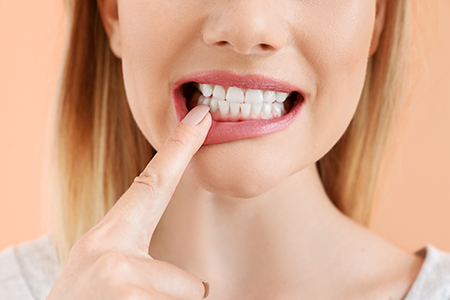

Gum disease is the leading cause of adult tooth loss, yet many people don’t realize how common and how preventable it can be. The Centers for Disease Control and Prevention estimate that roughly half of adults over 30 show signs of periodontal disease. At the office of Silk Dental Delray Beach (formerly Marc Bilodeau DMD), we help patients recognize early warning signs and take practical, evidence-based steps to protect their oral health.
Strong gums are the foundation of a lasting smile. This page explains how gum disease develops, what to watch for, and the treatment approaches we use to stop progression and restore healthy tissue wherever possible. Our goal is to give you clear, useful information so you can make confident decisions about periodontal care.
The periodontium includes the gums, the connective tissues, and the jawbone that support your teeth. When bacteria-rich plaque accumulates along the gumline and below it, the body reacts with inflammation. Left unchecked, that inflammatory response can damage the structures that hold teeth in place.
Periodontal disease often starts quietly. Mild inflammation may cause few obvious symptoms at first, which is why routine dental exams and professional cleanings are crucial. A trained clinician can detect early changes in gum health long before you notice discomfort or loose teeth.
Controlling the bacterial biofilm that causes inflammation is the foundation of prevention and treatment. Good daily hygiene, timely professional care, and targeted clinical interventions can keep periodontal disease from advancing and can preserve both function and appearance.
Because early periodontal disease can be subtle, recognizing common warning signs helps catch problems sooner. If you notice changes in how your gums look or feel, it’s worth scheduling an evaluation. Early intervention is far more predictable and less invasive than treating advanced disease.
Below are frequent indicators that gum disease may be present. If any apply to you, bring them up at your next dental visit so they can be evaluated and addressed.
Possible signs of periodontal disease include:
Gums that appear red, swollen, or tender to the touch
Bleeding during brushing, flossing, or while eating
Receding gumlines that expose more of the tooth or its root
Increased sensitivity to hot, cold, or sweet foods and drinks
Persistent bad breath or an unpleasant taste in the mouth
Teeth that feel loose, tipped, or have new gaps between them
Changes in the bite or the fit of removable partial dentures
Pus or discharge around the teeth and gums
Discomfort when biting or chewing, whether dull or sharp

Oral health and general health are closely connected. Research increasingly links chronic periodontal inflammation with conditions such as cardiovascular disease, diabetes complications, and certain respiratory illnesses. While periodontal disease on its own does not cause these conditions, managing gum inflammation supports overall well-being.
Preventing and treating gum disease reduces the bacterial burden in the mouth and can help lower sustained inflammatory signals in the body. That is one reason dental professionals emphasize early detection and consistent maintenance rather than waiting until symptoms become severe.
Our team emphasizes prevention through education, routine monitoring, and individualized care plans. By combining proven clinical techniques with clear guidance on home care, we help patients preserve both oral health and systemic wellness.
Gingivitis is the earliest, reversible stage of periodontal disease. It’s characterized by gum inflammation without loss of the connective tissues or bone that anchor teeth. Because gingivitis rarely causes pronounced pain, many people only notice it when bleeding or gum sensitivity occurs.
The encouraging news is that gingivitis responds well to professional cleanings paired with improved oral hygiene. A focused program of mechanical plaque removal, targeted home care strategies, and periodic professional follow-up usually restores healthy gum tissue if the condition is treated promptly.
Commitment to daily brushing, interdental cleaning, and regular professional maintenance is essential to prevent recurrence. For patients with risk factors—such as smoking, certain medications, or systemic health conditions—we design more intensive monitoring and support to keep gum inflammation under control.

Periodontitis describes the stage when inflammation has progressed to the point of damaging the connective tissues and bone that support teeth. As pockets deepen between the tooth root and gum, bacteria and toxins create a chronic destructive environment that can lead to tooth mobility and eventual loss.
Treatment in this phase aims to control infection, stop tissue breakdown, and, when feasible, regenerate or graft lost tissue. The specific methods chosen depend on the severity of pocketing, the amount of bone loss, and the patient’s overall health and oral hygiene habits.
Even with existing tissue loss, modern periodontal therapy can stabilize the condition and improve long-term prognosis. Working closely with your dental team to follow a personalized care plan is central to preserving teeth and restoring function.
We offer a full range of periodontal services designed to match the needs of each patient. From preventive strategies and non-surgical therapy to advanced surgical procedures when required, care is always tailored to the individual’s clinical findings and personal goals.
At Silk Dental Delray Beach (formerly Marc Bilodeau DMD), we integrate current best practices and technologies—such as precise diagnostic measurements, selective use of antimicrobials, and laser-assisted options when appropriate—into a coordinated treatment plan. Patient comfort, predictable outcomes, and long-term maintenance guide every recommendation.
Education is a core component of our work. We spend time explaining the condition, answering questions about treatment choices, and showing patients how to improve home care so that clinical gains are maintained between visits.
Periodontal care typically follows a stepwise approach. Early stages favor conservative, non-surgical techniques focused on reducing bacterial load and inflammation. If pockets persist or structural damage prevents effective cleaning, more advanced surgical methods may be recommended to restore a healthier environment for the gums and bone.
Decisions about specific therapies are based on a thorough assessment of pocket depths, tissue quality, radiographic bone levels, and individual medical factors. We discuss the risks and benefits of each option and plan follow-up maintenance to protect the investment of care.
Long-term success depends not only on the procedures performed but also on ongoing professional monitoring and consistent home care. Our team develops maintenance schedules tailored to each patient’s risk profile to keep disease under control.

When gum disease is detected early, treatment often begins with non-surgical measures. Scaling and root planing remove plaque and hardened deposits from beneath the gumline and smooth root surfaces so tissues can reattach more effectively.
Adjunctive therapies—such as locally delivered antimicrobials or carefully selected systemic medications—may be used to reduce harmful bacteria in deeper sites. These conservative approaches are consistent with professional guidelines that emphasize the least invasive, evidence-based care that achieves periodontal health.
After initial therapy, a reassessment determines whether pockets have responded. Many patients regain stable gum health with diligent home care and a structured maintenance schedule.
When pockets are too deep for complete cleaning or when regenerative treatment is needed, periodontal surgery can provide access to thoroughly remove infection and reshape supporting tissues. Procedures such as flap surgery, bone grafts, or soft tissue grafts aim to rebuild support and improve the environment for long-term maintenance.
In selected cases, modern technology—like dental lasers—can complement conventional surgical techniques to reduce pocket depths, address peri-implant inflammation, or reshape gum tissue for functional or cosmetic reasons.
Following surgical therapy, careful follow-up and commitment to home care are essential to protect healing sites and preserve clinical gains over time.
In short, periodontal disease is common but manageable when recognized early and treated with an individualized plan. If you have concerns about your gums or notice any of the signs described here, contact us for more information and to schedule an evaluation. Our team is ready to help you protect the foundation of your smile and maintain long-term oral health.
Most people don’t realize that periodontal disease is the leading cause of tooth loss among adults. According to statistics from the Centers for Disease Control and Prevention, one out of every two adults over the age of 30 in the United States has periodontal disease.
You may be surprised to learn that the human mouth is home to a wide variety of microbes. The fact is that over 700 different strains of bacteria have been detected in the oral cavity. Although some of these bacteria are beneficial, others are harmful to oral health. Without proper oral hygiene and routine dental care, these harmful bacteria can cause tooth decay and gum disease, compromising both your oral health and overall wellbeing.
In addition to inadequate oral hygiene and infrequent professional care, other factors, including smoking, genetic tendencies, and unchecked diabetes, can contribute to the escalation of periodontal disease.
Your gums and teeth have an interdependent relationship, which means healthy teeth depend on the support of healthy gums. Also, taking care of your smile does more than keep your teeth and gums in optimal condition; good oral health also supports systemic health. In addition to being the leading cause of tooth loss in adults, researchers are finding more and more links between periodontal disease and a number of medical problems, including heart disease, stroke, diabetes, respiratory problems, and adverse pregnancy outcomes such as pre-term and low birth-weight babies.
If you notice that your gums are bleeding with the slightest pressure while brushing or flossing, it’s a sign of gingivitis. Although gingivitis is the earliest stage of gum disease, it can easily be reversed with deeper cleanings as well as an improved regimen of oral hygiene at home.
In the absence of professional treatment and better home care, gingivitis progresses to the next stage, which is known as periodontitis. In this stage, the connective tissue and bone that hold the teeth in place begin to break down with an increase in pocketing between the teeth and bone, gum recession, and bone loss. Without proper treatment by your dentist, periodontitis will progress from a mild to moderate loss of supporting tissue to the destruction of the bone around the teeth.
Although gingivitis can often be reversed with improved oral hygiene and professional cleanings, as periodontal disease advances, more extensive procedures are required to halt its progression. Based on a complete assessment of your periodontal health and a review of possible contributing factors, our office will recommend the best options in care. Treatment for periodontitis may include a series of deeper cleanings known as root planing and scaling, surgical procedures to reduce pocket depth, bone or tissue grafts, laser procedures, or antimicrobial medications.
The cost of care depends on the type of procedures required to restore your periodontal health. If you have dental insurance, plans often cover treatment to prevent gum disease as well as many procedures to treat the various stages of gum disease. Our goal is to help patients restore and maintain good oral health. We do all we can to help you begin care without additional stress or delay. Our business office works with you to maximize your benefits and provide easier, more convenient payment options.
By seeing our office regularly for care and doing your best to eat a healthy diet and practice good oral hygiene, you can keep your smile in tip-top shape as well as protect your overall wellbeing.
At the office of Silk Dental Delray Beach (formerly Marc Bilodeau DMD), we provide a comprehensive range of services to address all your oral healthcare needs. You can rest assured that your smile is in the best of hands at our office. Our skilled and experienced team maintains a position at the forefront of advances in care and remains dedicated to providing the highest quality of skilled and compassionate treatment.
Quick Links